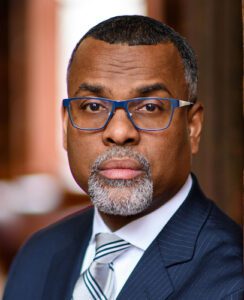Who is a member?
Our members are the local governments of Massachusetts and their elected and appointed leadership.

Eddie Glaude Jr.
Eddie Glaude Jr., a New York Times bestselling author, Princeton University professor and political commentator whose work has helped people better understand the dynamics of race, democracy and religion in America, will be the opening keynote speaker for the 45th MMA Annual Meeting & Trade Show on Jan. 19.
An MSNBC commentator and author of several books, including “Begin Again: James Baldwin’s America and Its Urgent Lessons for Our Own,” Glaude engages Americans in an honest dialogue about the country’s racial past and present. At the MMA Annual Meeting, he will discuss how America’s promise of equality has always rung hollow for Black Americans, even six decades after the civil rights movement. But the promise of equality still lives, he says, if people work together and create the conditions to think more carefully and systematically about the issues confronting America. The country needs a moral reckoning, he says, for a new America to emerge.
In his writing and speeches, Glaude talks about the “value gap” in the United States, in which white Americans remain prioritized over people of color. The mythology surrounding American democracy prevents us from confronting the racism embedded in the nation’s existence, he says, and allows Americans to absolve themselves of guilt and dismiss racist incidents as random occurrences.
“That belief, and the stories we tell and the practices that shape our daily lives, block the way to America becoming a multiracial democracy,” Glaude told an audience at Vassar College in September 2022. “And perhaps more importantly, that belief distorts and disfigures who we take ourselves to be as human beings. The value gap affects the moral quality of our living, in that it limits our capacity for generosity, our sense of humility, our idea of benevolence and mutuality, and distorts our view of justice.”
To achieve a true multiracial democracy, he says, America must start telling the truth about how it has harmed, and continues to harm, people of color.
“We have to narrate a different story of who we are as Americans,” Glaude said in a virtual talk at Morehouse College in 2021.
Glaude’s own story began in Moss Point, Mississippi, where he developed a love of books and an interest in politics. Graduating from high school at age 16, he earned a bachelor’s degree in political science from Morehouse College, a master’s degree in African American Studies from Temple University and a doctorate in religion from Princeton University.
Glaude began his teaching career at Bowdoin College and joined Princeton’s faculty in 2002. He served for more than 14 years as inaugural chair of Princeton’s Department of African American Studies, and he is the James S. McDonnell Distinguished University Professor of African American Studies. He also serves on the Board of Trustees at Morehouse College and appears regularly on shows including MSNBC’s “Morning Joe” and “Deadline: White House,” and on NBC’s “Meet the Press.”
Glaude’s books on race and politics include “Democracy in Black: How Race Still Enslaves the American Soul,” and “In a Shade of Blue: Pragmatism and the Politics of Black America.” A former president of the American Academy of Religion, Glaude’s books on religion and philosophy include “An Uncommon Faith: A Pragmatic Approach to the Study of African American Religion,” “African American Religion: A Very Short Introduction,” and “Exodus! Religion, Race and Nation in Early 19th Century Black America,” which earned the Modern Language Association’s William Sanders Scarborough Book Prize.
In his writings and speeches, Glaude discusses the pain of witnessing America turn its back repeatedly on its democratic principles. He says every step America has taken toward multiracial progress — including the enactment of the amendments to abolish slavery and ensure equal protection and voting rights, the passage of the Civil Rights Act of 1964 and the Voting Rights Act of 1965, and the election of the nation’s first Black president in 2008 — has triggered virulent backlashes, including the segregationist Jim Crow laws following the Civil War, voter suppression efforts, and racist mass shootings.
Instead of treating America’s democratic founding as a mission accomplished, Glaude urges Americans to view that history as a starting point, a foundation from which Americans can build a more equitable future.
“Ours should be a story that begins with those who sought to make real the promise of this democracy,” Glaude writes. “Put aside the fairy tale of America as ‘the shining city on the hill’ or ‘the redeemer nation,’ and recast the idea of perfecting the Union not as a guarantee of our goodness but a declaration of the ongoing work to address injustice in our midst.”